一般现在时专项练习题
三年级英语一般现在时专项练习30题

三年级英语一般现在时专项练习30题1. He ______ breakfast at 7:00 every morning.A. haveB. hasC. hadD. having答案:B。
解析:这题考查一般现在时中第三人称单数的动词形式。
句子的主语是he,是第三人称单数,在一般现在时中,第三人称单数作主语时,动词要用第三人称单数形式,have的第三人称单数形式是has。
A选项是动词原形,C选项是过去式,D选项是现在分词形式,都不符合语法要求。
2. My mother often ______ to the park on Sundays.A. goB. goesC. wentD. going答案:B。
解析:这里的主语是my mother,是第三人称单数。
在一般现在时中,当主语是第三人称单数时,动词要变成相应的第三人称单数形式。
go的第三人称单数形式是goes。
A选项是动词原形,C 选项是过去式,D选项是现在分词形式,所以选B。
3. They ______ their homework in the evening.A. doB. doesC. didD. doing答案:A。
解析:本题主语是they,是复数形式。
在一般现在时中,复数主语后的动词用原形。
do是动词原形,B选项是第三人称单数形式,C选项是过去式,D选项是现在分词形式,所以答案是A。
4. Tom ______ up at six o'clock every day.A. getB. getsC. gotD. getting答案:B。
解析:此句的主语是Tom,为第三人称单数。
一般现在时中,第三人称单数作主语时,动词要变为第三人称单数形式。
get 的第三人称单数形式是gets。
A选项是动词原形,C选项是过去式,D选项是现在分词形式,因此选B。
5. We ______ school at 8:00.A. startB. startsC. startedD. starting答案:A。
小升初英语一般现在时练习题30题
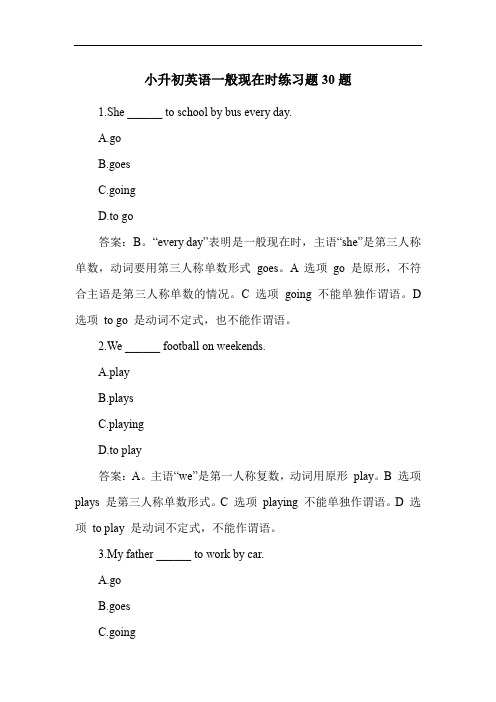
小升初英语一般现在时练习题30题1.She ______ to school by bus every day.A.goB.goesC.goingD.to go答案:B。
“every day”表明是一般现在时,主语“she”是第三人称单数,动词要用第三人称单数形式goes。
A 选项go 是原形,不符合主语是第三人称单数的情况。
C 选项going 不能单独作谓语。
D 选项to go 是动词不定式,也不能作谓语。
2.We ______ football on weekends.A.playB.playsC.playingD.to play答案:A。
主语“we”是第一人称复数,动词用原形play。
B 选项plays 是第三人称单数形式。
C 选项playing 不能单独作谓语。
D 选项to play 是动词不定式,不能作谓语。
3.My father ______ to work by car.A.goB.goesC.going答案:B。
主语“my father”是第三人称单数,动词要用第三人称单数形式goes。
A 选项go 是原形,不符合。
C 选项going 不能单独作谓语。
D 选项to go 是动词不定式,不能作谓语。
4.They ______ TV in the evening.A.watchB.watchesC.watchingD.to watch答案:A。
主语“they”是第三人称复数,动词用原形watch。
B 选项watches 是第三人称单数形式。
C 选项watching 不能单独作谓语。
D 选项to watch 是动词不定式,不能作谓语。
5.My mother ______ cooking every day.A.likeB.likesC.likingD.to like答案:B。
主语“my mother”是第三人称单数,动词要用第三人称单数形式likes。
A 选项like 是原形,不符合。
一般现在时练习题及答案
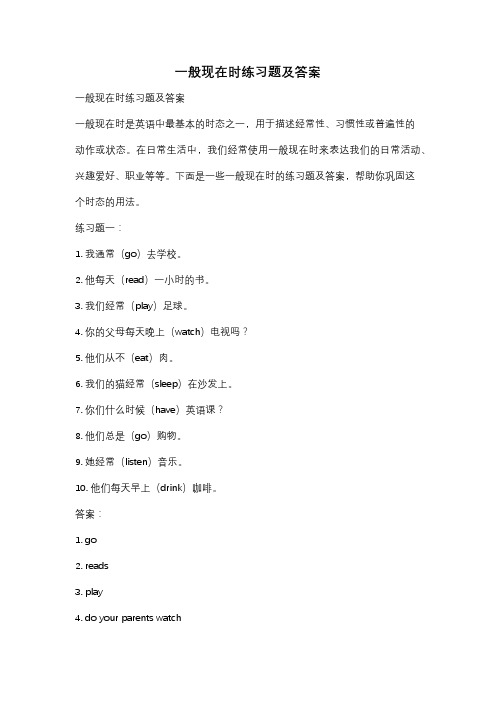
一般现在时练习题及答案一般现在时练习题及答案一般现在时是英语中最基本的时态之一,用于描述经常性、习惯性或普遍性的动作或状态。
在日常生活中,我们经常使用一般现在时来表达我们的日常活动、兴趣爱好、职业等等。
下面是一些一般现在时的练习题及答案,帮助你巩固这个时态的用法。
练习题一:1. 我通常(go)去学校。
2. 他每天(read)一小时的书。
3. 我们经常(play)足球。
4. 你的父母每天晚上(watch)电视吗?5. 他们从不(eat)肉。
6. 我们的猫经常(sleep)在沙发上。
7. 你们什么时候(have)英语课?8. 他们总是(go)购物。
9. 她经常(listen)音乐。
10. 他们每天早上(drink)咖啡。
答案:1. go2. reads3. play4. do your parents watch5. eat6. sleeps7. do you have8. go9. listens to10. do they drink练习题二:1. 你通常几点起床?2. 他们每周末去哪里?3. 你的朋友们喜欢什么运动?4. 你们的狗喜欢吃什么食物?5. 他们多久去一次健身房?6. 你们的邻居是干什么的?7. 你每天晚上做什么?8. 他们有多少个孩子?9. 你喜欢什么颜色?10. 他们通常什么时候吃晚饭?答案:1. What time do you usually get up?2. Where do they go on weekends?3. What sports do your friends like?4. What food does your dog like?5. How often do they go to the gym?6. What do your neighbors do?7. What do you do every evening?8. How many children do they have?9. What color do you like?10. When do they usually have dinner? 练习题三:1. 我们经常(go)购物。
(完整版)一般现在时练习题附答案解析
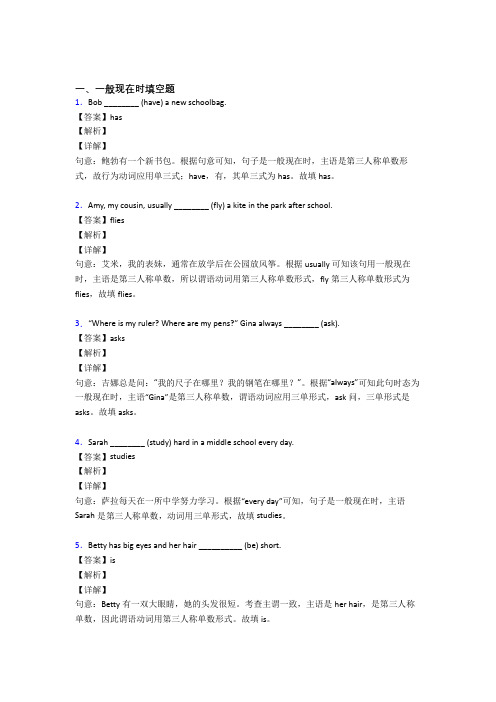
一、一般现在时填空题1.Bob ________ (have) a new schoolbag.【答案】has【解析】【详解】句意:鲍勃有一个新书包。
根据句意可知,句子是一般现在时,主语是第三人称单数形式,故行为动词应用单三式;have,有,其单三式为has。
故填has。
2.Amy, my cousin, usually ________ (fly) a kite in the park after school.【答案】flies【解析】【详解】句意:艾米,我的表妹,通常在放学后在公园放风筝。
根据usually可知该句用一般现在时,主语是第三人称单数,所以谓语动词用第三人称单数形式,fly第三人称单数形式为flies,故填flies。
3.“Where is my ruler? Where are my pens?” Gina always ________ (ask).【答案】asks【解析】【详解】句意:吉娜总是问:“我的尺子在哪里?我的钢笔在哪里?”。
根据“always”可知此句时态为一般现在时,主语“Gina”是第三人称单数,谓语动词应用三单形式,ask问,三单形式是asks。
故填asks。
4.Sarah ________ (study) hard in a middle school every day.【答案】studies【解析】【详解】句意:萨拉每天在一所中学努力学习。
根据“every day”可知,句子是一般现在时,主语Sarah是第三人称单数,动词用三单形式,故填studies。
5.Betty has big eyes and her hair __________ (be) short.【答案】is【解析】【详解】句意:Betty有一双大眼睛,她的头发很短。
考查主谓一致,主语是her hair,是第三人称单数,因此谓语动词用第三人称单数形式。
故填is。
6.The little girl ________ (dress) herself every morning.【答案】dresses【解析】【详解】句意:那个小女孩每天给自己穿衣服。
一般现在时练习题大全
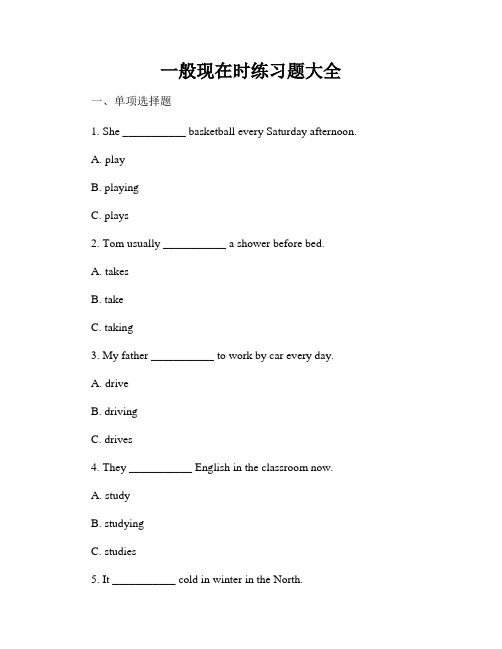
一般现在时练习题大全一、单项选择题1. She ___________ basketball every Saturday afternoon.A. playB. playingC. plays2. Tom usually ___________ a shower before bed.A. takesB. takeC. taking3. My father ___________ to work by car every day.A. driveB. drivingC. drives4. They ___________ English in the classroom now.A. studyB. studyingC. studies5. It ___________ cold in winter in the North.A. isB. beC. are二、填空题1. He often ___________ (go) swimming in the summer.2. She ___________ (not like) coffee, she prefers tea.3. They ___________ (watch) TV every evening after dinner.4. It usually ___________ (snow) in December in our city.5. Tom ___________ (not play) video games on weekdays.三、改错题1. He never go to school on Sundays. ___________2. My mother cook dinner in the kitchen now. ___________3. She like reading books before bedtime. ___________4. They watch a movie every Friday evening. ___________5. I am go to the park with my friends tomorrow. ___________四、连线题1. She drinks a. water every day.2. They play b. football in the park.3. He eats c. an apple for breakfast.4. We watch d. TV in the living room.5. I go e. to school by bus.五、阅读理解Tom is a high school student. He lives with his parents and his younger sister in a small town. Tom usually gets up at 6:30 in the morning. After brushing his teeth and washing his face, he has breakfast at 7:00. Then, he takes the school bus to school. Classes start at 8:00 and finish at 3:00 in the afternoon. After school, Tom usually plays basketball with his friends. At 6:00, he has dinner with his family.1. What time does Tom usually get up?A. 6:00B. 6:30C. 7:002. How does Tom go to school?A. By carB. By school busC. By bike3. When does Tom have dinner?A. At 5:00B. At 6:00C. At 7:00六、完形填空My name is Lily. I am a 10-year-old girl. I __1__ to school from Monday to Friday. I usually get up at 7:00 in the morning. After having breakfast, I __2__ my teeth and wash my face. Then, I take the bus to school. Classes __3__ at 8:00 and finish at 3:00. In the afternoon, I __4__ piano lessons. I like playing the piano very much. After that, I go home and do my homework. I often read books before going __5__ bed.1. A. doesB. goC. like2. A. brushB. eatC. play3. A. startB. startsC. to start4. A. haveB. takesC. go5. A. atB. toC. for以上就是一般现在时练习题的大全,希望对大家的英语学习有所帮助。
一般现在时专项练习(含答案解析)
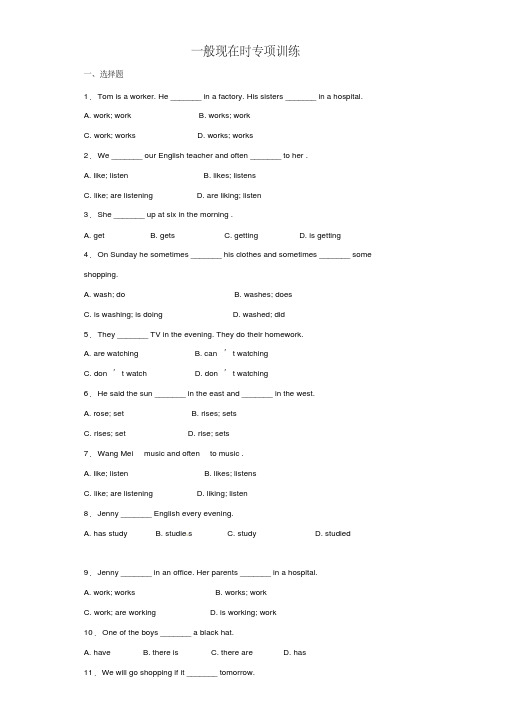
A. has study
B. studie s
C. study
D. studied
9. Jenny _______ in an office. Her parents _______ in a hospital.
A. work; works
B. works; work
C. work; are working
A. like; listen
B. likes; listens
C. like; are listening
D. are liking; listen
3. She _______ up at six in the morning .
A. get
B. gets
C. getting
D. is getting
术,根据句 意判断句子是一般现在时态,主语是第三人称单数,动词应变为
studies,因此
答案为 studies。
名师解析:⑴由 often 可知,本句是一般现在时,主语是第一人称
I 的复数形式,所以动词
Hale Waihona Puke 用原形。因此答案为 play。14. 【答案】 gets【解析】 usually 是一般现在时的标志,主语 为 gets,因此答案为 gets。
he 是第三人称单数,动词应变
15. 【答案】 Do ,brush【解析】 every morning 是一般现在时的标志, 主语 you 是第二人称,
第三人称单数 Jenny,动词应变三单形式为 study →studies,故答案为: B。句意为:詹妮每 天晚上都学习英语。
易错提示: study 在变成第三人称单数时, y 谓语辅音之后,应变 y 为 i 加 es。
(完整版)一般现在时练习题及答案

14.I think the boy ________ (look) like his father. 【答案】looks 【解析】 【详解】 句意:我觉得这个男孩看起来像他的父亲。根据语境可知,该句为一般现在时,主语“the boy”是第三人称单数,谓语用动词的第三人称单数形式,“look”的第三人称单数形式是 “looks”。故填 looks。
2.Many kids ________ (在……有困难) getting along with their parents nowadays. 【答案】have trouble##have problems##have difficulty 【解析】 【详解】 句意:现在很多孩子与父母相处有困难。“在……有困难”为 have trouble/problems/difficulty doing sth.。本句为一般现在时,主语 many kid 是复数,动词 have 使用原形。故填 have trouble/problems/difficulty。
24.Sam often ________ (fly) kites with his friends on windy days. 【答案】flies 【解析】 【详解】 句意:萨姆经常在刮风的日子和他的朋友放风筝。根据“often”可知,该句为一般现在时, 主语“Sam”是第三人称单数,谓语用动词的三单形式,“fly”的三单形式是“flies”。故填 flies。
小学英语一般现在时习题(200题)
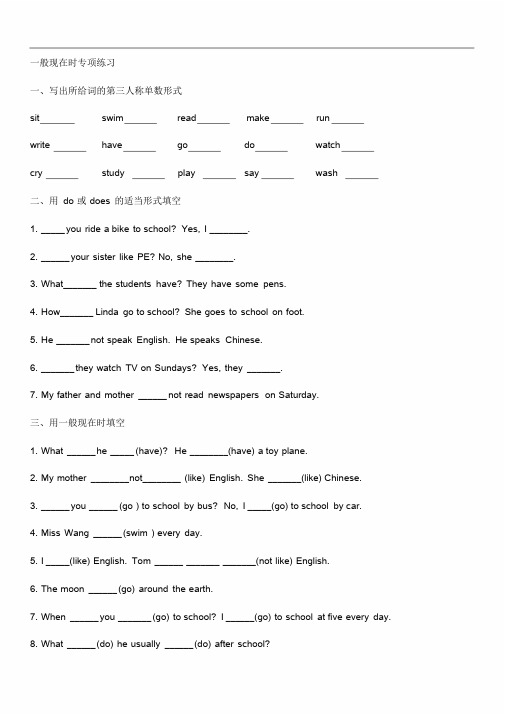
一般现在时专项练习一、写出所给词的第三人称单数形式sit swim read make runwrite have go do watchcry study play say wash二、用do 或does 的适当形式填空1. _____ you ride a bike to school? Yes, I ________.2. ______ your sister like PE? No, she ________.3. What_______ the students have? They have some pens.4. How_______ Linda go to school? She goes to school on foot.5. He _______ not speak English. He speaks Chinese.6. _______ they watch TV on Sundays? Yes, they _______.7. My father and mother ______ not read newspapers on Saturday.三、用一般现在时填空1. What ______ he _____ (have)? He ________(have) a toy plane.2. My mother ________not________ (like) English. She _______(like) Chinese.3. ______ you ______ (go ) to school by bus? No, I _____(go) to school by car.4. Miss Wang ______ (swim ) every day.5. I _____(like) English. Tom ______ _______ _______(not like) English.6. The moon ______ (go) around the earth.7. When ______ you _______ (go) to school? I ______(go) to school at five every day.8. What ______ (do) he usually ______ (do) after school?8. The girl _______ (look) beautiful.四、句型转换9. I go to school by bus. (用He 做主语变否定句)________________________________________10. Kim plays baseball very well. (变一般疑问句)________________________________________11. David doesn’t like learning French. (变肯定句)________________________________________12. Alan doesn’t watch TV on school nights. (变肯定句)________________________________________13. We have enough time to do it. (变否定句)________________________________________14. Snoopy has a car. (对划线部分提问)______________________________________15. Do you have a pencil? (把主语改成she)_____________________________________________16. They play basketball in the park on Sunday morning.( 对划线提问)○1 ○2 ○3___________________________________________________________________ ______________________________________________________________________________________________________________________________________I、用括号中所给词的适当形式填空:1.The buses ______ (use) a lot of oil.2.Each of us ______ (have) strong points and weak points.3.My daughter _________(watch) TV every day. Sometimes she _______ (see) a film on Sunday. 4.Li Wei ________ (have) a daughter. She stays _______ in a nursery.5.Our family _________(be) a happy one.6.Her mother ___________(teach) English at a middle school.7.Jack often ___________(listen) to the radio.8.He ________ (say) that Prof. Li is _____ tired.改句子1.This is my pencil.( 变一般疑问句)____ _______________ your pencil ?9. These red socks are Kate ’s . (变一般疑问句)_ ____________________ socks Kate’s ?10. I want to buy a big green bag . ( 变特殊疑问句) __________________ you want to buy ?11. Mary does not have any books . ( 变肯定句)Mary ___________________books .12. The clothing shop is on sale . ( 变为否定)________________________________.13. She likes the black bag very much . ( 变为否定句) ______________________________.14. I buy the pants for only 50 Yuan. ( 用she 改写句子)___ _________________ the pants for only 50 Yuan.15. It’s an English dictionary . ( 对画线部分提问) ____________________________?16. Lily and Lucy are fifteen years old now . ( 对画线部分提问)_____ _______________Lily and Lucy ?17. Her dog is 2 years and 5 months old . ( 变为否定句) Her dog ____ _____ 2 years and 5 months old . 11. We live in Nanchang. ( 改为否定句) We ____ ____ ____ in Nanchang .17. It’s lunch time. (改为同义句)It’s ______ ______ ______ .18. My sweater is black and white. ( 对划线部分提问) ______ ______ is ______ sweater?19. She has long, black hair. ( 改为同义句) ____ hair ____ long and black.20.. They are three blue desks. ( 对划线部分提问) ____ ____ they?用所给动词的适当形式填空。
- 1、下载文档前请自行甄别文档内容的完整性,平台不提供额外的编辑、内容补充、找答案等附加服务。
- 2、"仅部分预览"的文档,不可在线预览部分如存在完整性等问题,可反馈申请退款(可完整预览的文档不适用该条件!)。
- 3、如文档侵犯您的权益,请联系客服反馈,我们会尽快为您处理(人工客服工作时间:9:00-18:30)。
一般现在时专项练习题1.概念:一般现在时表示经常的、习惯性的动作或存在的状态一般现在时表示现在经常反复发生的动作、存在的状态或习惯性的动作的时态。
可概括为①经常性或习惯性动作;②长期存在的特征或状态;③普遍真理、客观事实等。
,。
2.构成:一般现在时的构成主要有两种形式,一般现在时用行为动词的原形,但第三人称单数作主语时,动词的词尾要加-S。
:(1)be型:句子的谓语动词只有be(am,is或are):a.肯定句中,只出现be,如:I am a student.我是一名学生。
b.否定句中,要在be后面加not,如:;She isn't a teacher.她不是教师。
c.一般疑问句,要将be放在句子开头(注意句首字母大写),句尾用问号,答语用Yes,主语+be.或No,主语+be+not.如:—Are you ready—你准备好了吗—Yes,I am.—是的,我准备好了。
(—No,I'm not.—不,我没准备好。
)(2)实义动词型:句中的谓语动词为实义动词(也叫行为动词):a.肯定句中,只出现实义动词,如:I get up in the morning.我早晨起床。
.b.否定句中,要在实义动词前面加do(does)+not,do(does)作助动词,本身无意义,常与not缩写成don't(doesn't),如:I don't like vegetables.我不喜欢蔬菜。
c.一般疑问句,要在句子开头加助动词Do(does),句尾用问号,简略答语用Yes,主语+do(does).或No,主语+do(does)+not.如:—Do you like oranges—你喜欢桔子吗—Yes,I do.—是的,我喜欢。
(—No,I don't.—不,我不喜欢。
)3, 一般现在时的用法1) 经常性或习惯性的动作,常与表示频腮度的时间状语连用。
…时间状语:every…, sometimes, at…, on SundayI leave home for school at 7 every morning.2) 客观真理,客观存在,科学事实。
The earth moves around the sun.Shanghai lies in the east of China.3) 表示格言或警句中。
Pride goes before a fall. 骄者必败。
注意:此用法如果出现在宾语从句中,即使主句是过去时,从句谓语也要用一般现在时。
]例:Columbus proved that the earth is round..4) 现在时刻的状态、能力、性格、个性。
I don't want so much.Ann Wang writes good English but does not speak well.比较:Now I put the sugar in the cup.I am doing my homework now.第一句用一般现在时,用于操作演示或指导说明的示范性动作,表示言行的瞬间动作。
再如:Now watch me, I switch on the current and stand back. 第二句中的now是进行时的标志,表示正在进行的动作的客观状况,所以后句用一般>主要通过谓语动词的变化和用时间词语来表示,其中最主要的是谓语动词的变化。
现在一般时动词变化的规则是:1.如果主语是名词复数和第一人称I、 we ,谓语动词不用做任何变化,即仍然用动词原型表示:We usually go to school at 7:30. 我们通常7:30上学去。
[go]My parents give ten yuan to my sister every week.我父母每星期给我妹妹十元钱。
[give]2.主语是任何一个单数名词或者是第三人称单数,谓语动词要进行必要的变化。
特别提一点:不可数名词也算作单数处理。
3.谓语动词的变化规律是:(1) 在动词后加-s,-es read - reads,write - writes,say - says(2) 以s,x,ch,sh 结尾的词加-es teach - teaches,wash - washes,guess - guesses(3) 以辅音字母+y结尾的词变y为i再加-es try - tries,carry - carries;(4) 特殊变化的词be (是) - am, is, areI am ;she/he/it,名词单数都用 is ; we, you, they, 名词复数都用are have (有) - have, hasI, we, you, they, 名词复数都用have ;she/he/it is, 名词单数都用 has (5) 助动词,不论单复数、不论什么人称都没有变化,都用 can, may, must, need, ought to 等。
而且,句子中有了助动词,谓语动词就不需要有任何变化了,即用动词原形表示。
请看下面的例子:Lucy is at home now. 露茜现在在家。
;We have six classes every day. 我们每天上六节课。
I often get up at 6:30. 我经常6:30起床。
Jack likes Chinese food very much. 杰克很喜欢中国饮食。
We can see some pictures on the wall. 我们能看到墙上的画(一)单选:1. Where Lucy come fromA. doB. doesC. isD. are2. Most of the students China.<A. comes fromB. is fromC. are fromD. come of3. We speak English .A. every daysB. everydayC. very dayD. every day4. My math teacher a big pair of glasses.A. wearsB. put onC. wearD. puts on5. What your father and motherA. does, doB. do, doC. are, doD. do, does(二)用动词适当形式填空:\1. His radio is broken. It (sound) terrible.2. Did somebody drop water on the rug It (look) wet.3. Every year my parents (give) me a present for my birthday.4. The club (send) her a letter every month.5. your dad (wash) his car once a week Yes, he does.6. Lin Tao is a good student. He (study) very hard.7. They ( work) at the bank.(三)句型转换:-1. My living room has three windows. (改为否定句)2. Jim and Jack like swimming on Sundays.(就划线部分提问)3. We are in the same class. (改为一般疑问句)4. He comes from England.(就划线部分提问)…一、用所给动词的适当形式填空。
1. I often (help) my mother with housework.2. Uncle Wang ( introduce) his daughter to us.3. He (have) music class in Mondays.4. How (do) he (get) there5. (do) you (agree) with me6. All of us ( study) hard.7. He always ( forget) to close the window.—8. Grandma often (cook) dinner for our family.二、填空。
Mrs. Black’s DayMrs. Black often (get) up at 7:00 on Sunday morning. She (have) breakfast at 8:30. She (have) a little dog. She( like) to go to the park with her dog. At 10:50, Mrs. Black sometimes ( wash) her clothes. At 3:00 . she usually (go)shopping. She often (make)supper at 6:00 . She doesn’t (watch)TV at night. She (go) to bed at about 10:.三、联词组句。
1. tomorrow, give it back , please2. is, it, today, what day>3. Uncle John, I, speak to, May, please4. some money, borrow, I, from you, May5. at this time of day, the shop, I think, is, closed一般现在时用法专练(A)Ⅰ.用括号内动词的适当形式填空。
[1. He often (have) dinner at home.2. Daniel and Tommy (be) members of the Reading Club.3. She and I (take)a walk together every evening.4. There (be) some water in the bottle.5. We (not watch) TV on weekdays.6. Nick (not do) his homework on Sundays.7. they (like) the World Cup8. What they usually (do) on holidays)9. your parents (read) newspapers every day10. The girl (teach) us English on Sundays.Ⅱ.按照要求改写句子。
